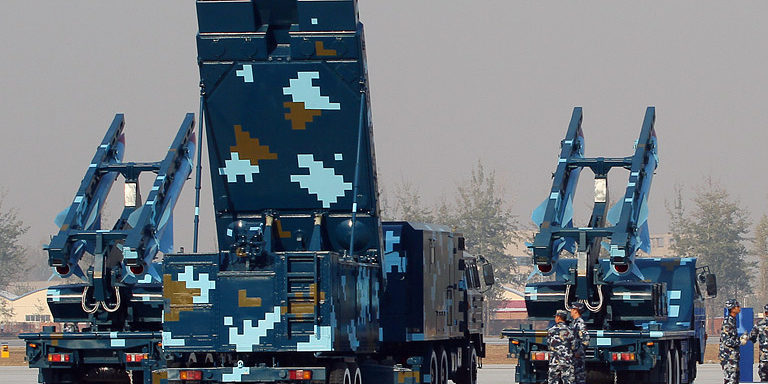Quick Facts
| PRC/NATO Designation | HQ-12 (KS-1) |
| Variants |
HQ-12A (KS-1A) HQ-12C (KS-1C) HQ-22 / FK-3 |
| Mobility and Role | Ground-based/road-mobile; short-range and medium-range air and missile defense |
| Range | 5 – 50 km (HQ-12, KS-1A), 5 – 70 km (KS-1C), 150 – 170 km (HQ-22) |
| Sensors |
KS-1: SJ-212 engagement radar; engagement range of 27 km KS-1A: HT-233 radar; 50 km range OR H-200 radar; 70 km range KS-1C: H-200 radar |
| Targets | Low-flying aircraft, medium-range ballistic missiles, cruise missiles, and UAVs |
| Status/Exports | Operational; Exported to Malaysia, Myanmar, Thailand, Turkmenistan, and Uzbekistan |
| Designer/Producer | Jiangnan Space Industry Group |
Overview
The KaiShan-1 (also known as the Hong Qi-12) is the first Chinese aerial defense system to feature a phased-array radar, with each variant having a further range than the last.[i]A typical HQ-12 battery includes one planar passive phased-array radar (PPAR), four launchers preloaded with two missiles each, and 16 additional missiles, along with command-and-control and generator units.[ii]The PLA claims HQ-12 has a single-shot kill probability of 89 percent.[iii]
Differences between the variants are due primarily to different radar units: KS-1 typically uses SJ-212 engagement radar, derived from the Russian 30N6E1 Tomb Stone, which can track up to 50 targets and engage three of them at ranges up to 27 kilometers.[iv]KS-1A has used two types of engagement radar; the original HT-233 radar has a range of 50 kilometers, and the newer H-200 radar has a range of 70 kilometers and can track up to 100 targets.[v]Along with using the H-200 radar, KS-1C fires individually-launched, cannister-encased missile rounds instead of paired, rail-mounted missiles; this effectively doubles the number of potential interceptors available in each battery.[vi]
In 2016, China unveiled the advanced HQ-22 and its identical export designation, FK-3. HQ-22 is a second-generation variant of the HQ-12, which features a medium-long engagement range of 150 to 170 km.[vii]HQ-22 can reportedly destroy U.S. third-generation aircraft.[viii]It is roughly equivalent to the MIM-23 Hawk, the precursor to the American Patriot system.
Strategic Implications
The HQ-12 was primarily designed to destroy UAVs and helicopters, but its more advanced variants are also capable of destroying ballistic and cruise missiles flying at speeds exceeding Mach 3.[ix]While the original HQ-12 system is largely obsolete, the KS-1A and KS-1C offer reliable protection for Chinese military assets and coastal cities. Moreover, PLA’s developments of the HQ-22 and FK-3 should trouble the United States. The real danger lies in FK-3’s export potential, as the extended-range engagement radar and high kill probability could render U.S. allies’ third-generation aircraft inoperable in Central and Southeast Asia in the event of a conflict.
Timeline
November 2016: The PLA unveils the HQ-22 and export variant FSK-3 at Airshow China 2016.[x]
September 2016: Thailand signs a memorandum of understanding to buy KS-1A from China.
February 2016: China secretly sells two KS-1A batteries—one to Turkmenistan and one to Uzbekistan.[xi]
July 2015: Myanmar receives the first batch of the KS-1A systems from China.[xii]
2007: HQ-12 enters service in the PLA.[xiii]
2005: Malaysia signs a memorandum of understanding to buy KS-1A from China.
2005: China Precision Machinery Import and Export Corporation unveils the KS-1A.
1998: Jiangnan Space Industry Grouppublicly unveils the HQ-12 at the Zhuhai air show.[xiv]
1994: Development is completed for the HQ-12.
1989: An HQ-12 prototype is successfully test-fired for the first time.[xv]
Recent News
References
[i]http://defence-blog.com/army/china-unveils-new-generation-of-surface-to-air-missile-weapon-system-at-the-airshow-china-2016-exhibition-in-zhuhai.html
[ii]https://www.globalsecurity.org/military/world/china/ks-1.htm
[iii]http://www.ausairpower.net/APA-PLA-IADS-SAMs.html
[iv]http://www.ausairpower.net/APA-HQ-9-12-Battery-Radars.html#mozTocId91258
[v]http://www.globalmil.com/military/missile_force/china/air_defence_missile/2017/0107/370.html
[vi]https://www.globalsecurity.org/military/world/china/ks-1.htm
[vii]http://nevskii-bastion.ru/fk-3-china/
[viii]Ibid.
[ix]http://www.deagel.com/Artillery-Systems/HQ-12A_a002444001.aspx
[x]http://defence-blog.com/army/china-unveils-new-generation-of-surface-to-air-missile-weapon-system-at-the-airshow-china-2016-exhibition-in-zhuhai.html
[xi]http://www.eurasianet.org/node/71971
[xii]http://defence-blog.com/news/myanmar-receive-first-batch-sam-missiles-hq-12-ks-1a.html
[xiii]http://www.deagel.com/Defensive-Weapons/HQ-12_a002445001.aspx
[xiv]https://thaimilitaryandasianregion.wordpress.com/2016/04/22/ks-1-missile-china/
[xv]https://www.globalsecurity.org/military/world/china/ks-1.htm

